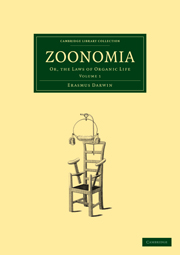
-
Select format
-
- Publisher:
- Cambridge University Press
- Publication date:
- August 2011
- July 2009
- ISBN:
- 9780511704024
- 9781108005494
- Dimensions:
- Weight & Pages:
- Dimensions:
- (297 x 210 mm)
- Weight & Pages:
- 1.46kg, 616 Pages
You may already have access via personal or institutional login
Book description
Erasmus Darwin (1731–1802) is remembered not only as the grandfather of Charles but as a pioneering scientist in his own right. A friend and correspondent of Josiah Wedgwood, Joseph Priestley and Matthew Boulton, he practised medicine in Lichfield, but also wrote prolifically on scientific subjects. He organised the translation of Linnaeus from Latin into English prose, coining many plant names in the process, and also wrote a version in verse, The Loves of Plants. The aim of his Zoonomia, published in two volumes (1794–6), is to 'reduce the facts belonging to animal life into classes, orders, genera, and species; and by comparing them with each other, to unravel the theory of diseases'. The first volume describes human physiology, especially importance of motion, both voluntary and involuntary; the second is a detailed description of the symptoms of, and the cures for, diseases, categorised according to his physiological classes.
Contents
Metrics
Altmetric attention score
Full text views
Full text views help Loading metrics...
Loading metrics...
* Views captured on Cambridge Core between #date#. This data will be updated every 24 hours.
Usage data cannot currently be displayed.
Accessibility standard: Unknown
Why this information is here
This section outlines the accessibility features of this content - including support for screen readers, full keyboard navigation and high-contrast display options. This may not be relevant for you.
Accessibility Information
Accessibility compliance for the PDF of this book is currently unknown and may be updated in the future.


